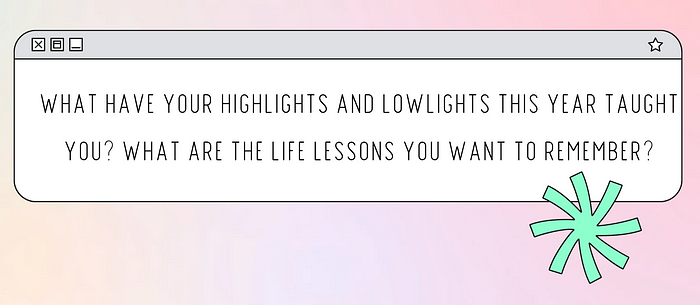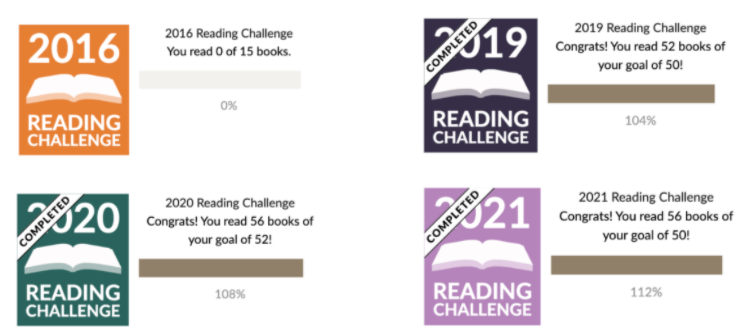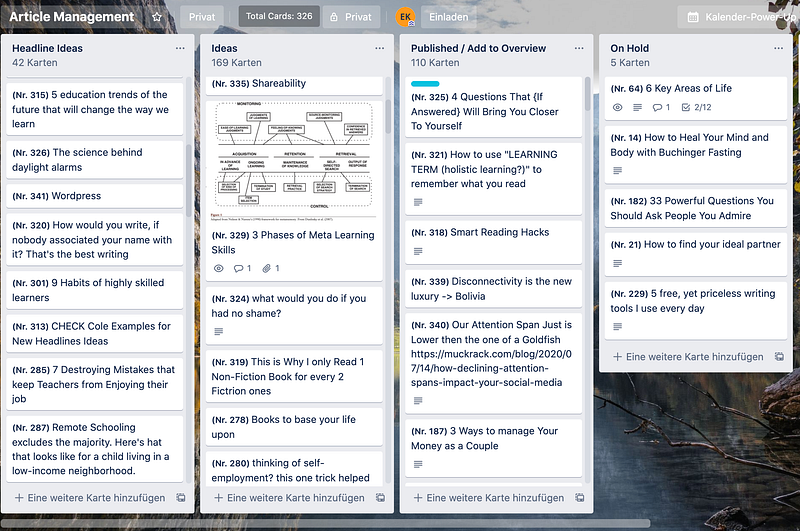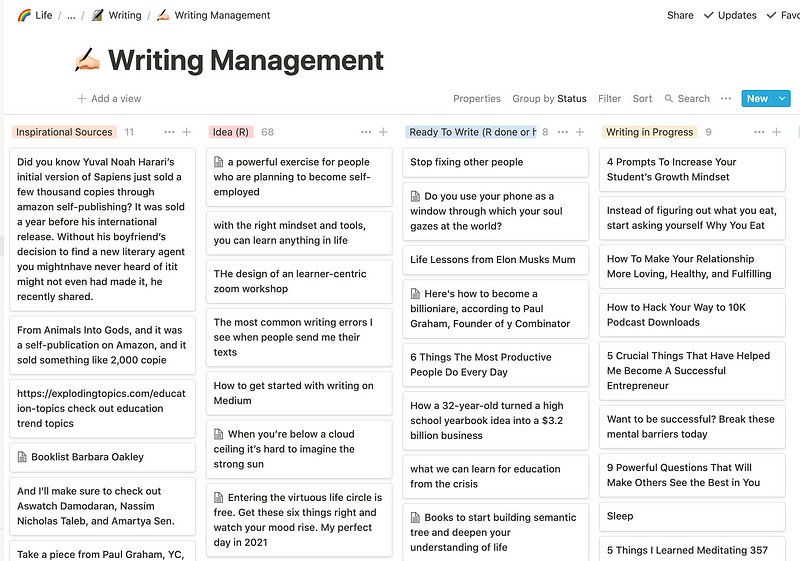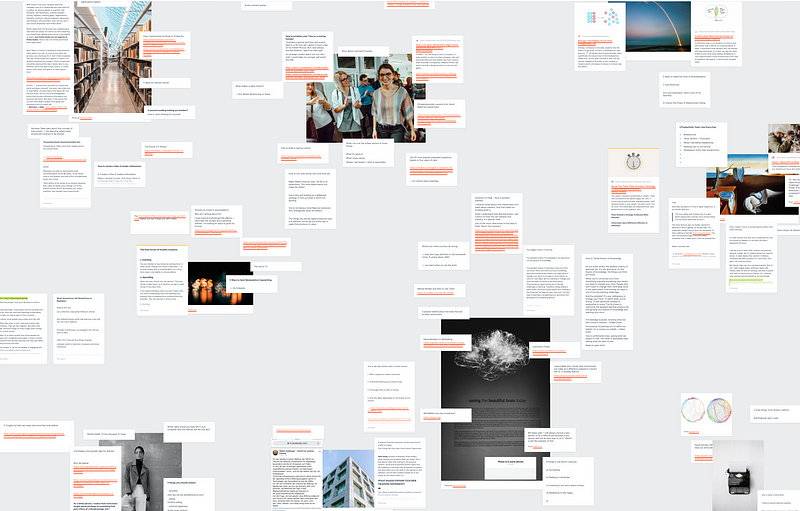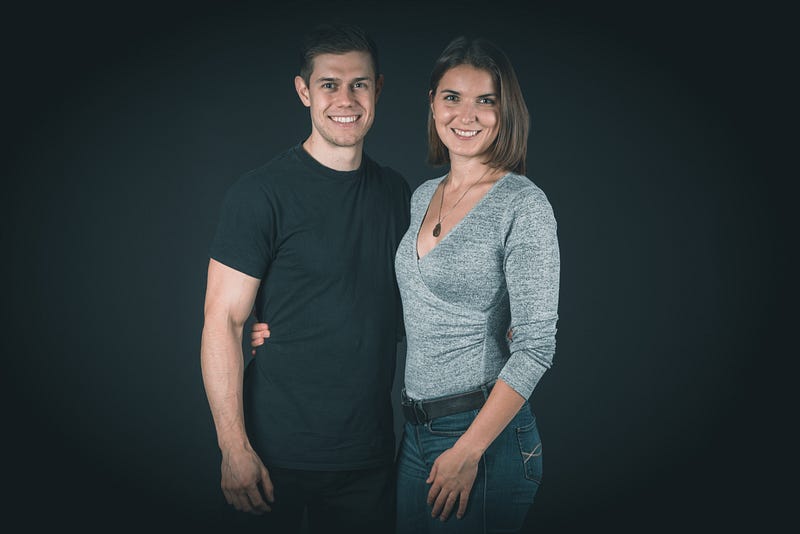A no-fluff template for living a more intentional life.

I should not compare myself to others, but I do it anyway.
I browse social feeds and see acquaintances mastering the most challenging yoga pose or raising millions of venture capital. I then enter thought patterns of no being and doing enough.
At the turn of the year, it’s easy to get lost in thoughts about what you don’t have instead of focusing on all the things you do have. But not much good can grow from the feeling of insufficiency.
One tool that helps me overcome feelings of inadequacy and start the new year with a deep sense of trust and power is my annual review.
I have done the review for six years in a row, and it has been life-transforming, specifically through two side effects:
- Boosting self-efficacy— you zoom out to take a more nuanced look at your progress, revealing the factors that contributed to your failures and successes, recognising patterns, learning from key insights, and integrating them into your next year.
- Increasing intentional living — you develop an understanding of what matters to you; you can see whether what you’re doing with your life is what you actually want to direct your time and energy to.
For example, as a late millennial and first-gen student from a well-resourced country, I grew up in a society that equates hard work with success. I unconsciously learned what’s acceptable (attaching self-worth to productivity) and what’s not (embodying felt emotions). Reflecting on how I relate to work helped me see patterns and unlearn beliefs and habits I perceived as harmful to my well-being and relationships.
This article guides you through the process and questions I use to look at the past, the future, and distinct life areas — from health to work to relationships, wealth, and more.
“My Annual Review forces me to look at my actions over the past 12 months and ask, ‘Are my choices helping me live the life I want to live?’”
— James Clear
Before you start, keep this in mind
I review my review each year and look for ways to improve it. Over the years, different brilliant minds and resources have inspired my thinking, such as Anne-Laure Le Cunff, Sara Blakely, James Clear, Michael Simmons, the free YearCompass, and the book Designing Your Life.
There is no single right way to do it. The best way to complete it depends on how much time you have and what you want to focus on.
Take anything that feels helpful for you and ignore the rest. You might do the entire review or just answer one or two questions.
This is not a test you need to pass — it’s a framework intended to help you wherever you are. So treat it like a buffet, and just take what looks delicious and nurturing for you.
The review is split into three parts — your past, a deep dive into your life’s areas, and your future. The below screenshots are from a template I create (access it free here).
Doing such a review is intense — you’re revisiting your key emotions and lived experiences. It’s normal to feel resistance or tiredness. Take breaks whenever you need them. I like to spread my review over an entire week, completing it a couple of questions at a time. But again — you are the only one to judge how you want to do it. Ready? Let’s start.
1) Reflecting on the past
Starting with open-ended explorative questions allows your most memorable experiences to bubble up. How have you lived your life? What feelings remain? By beginning with an explorative investigation, you allow your
Start with recalling things from your memory. Once you’re done, look at journals, calendars, diaries, and your camera roll, and add anything note-worthy.
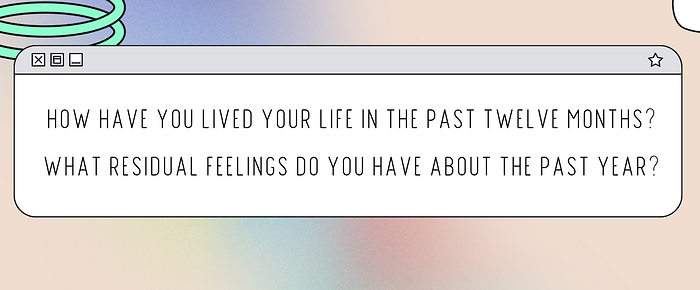
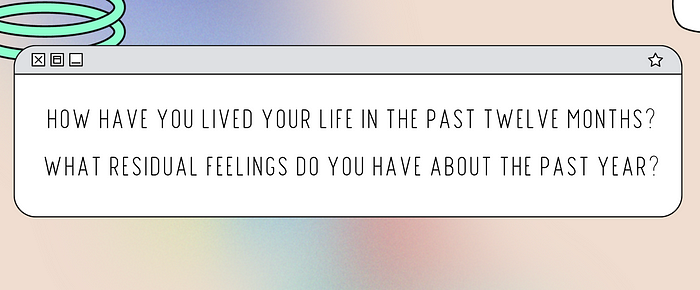
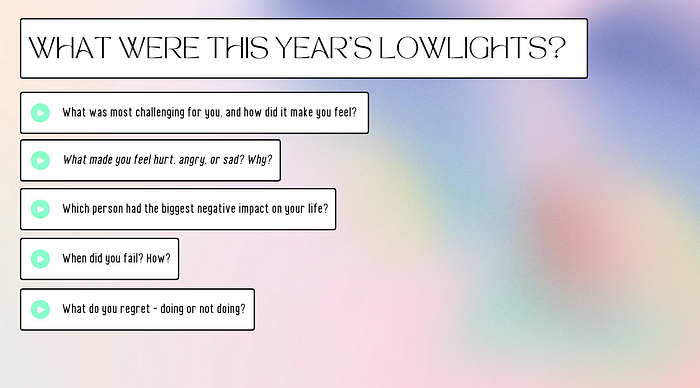
Once you feel your answers are more or less complete, you can stop. Then, if you feel like it, share your highlights and lowlights with a friend, or send kind messages to people that were part of your most memorable experiences.
2) Diving deep into your areas of life
In this part, you take a more in-depth look at each area of your life. If you don’t feel the six life areas apply to you, feel free to replace them with whatever seems more adequate for you.
I’m most happy when I put equal focus on all life areas. I can be in perfect health, but I might be unhappy if my relationships are loaded with unresolved conflict and a feeling of disconnection.
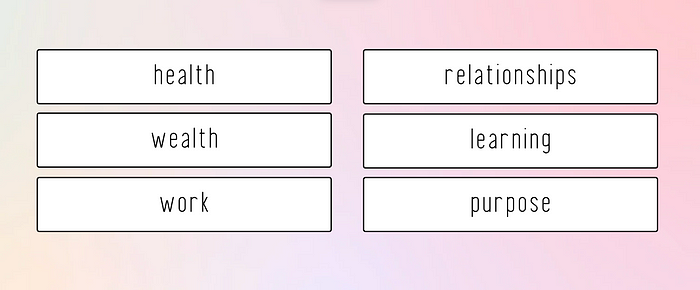
When looking at each life area, it is most helpful to consider three prompts. When answering “What went well?” and “What could have gone better?” I focus on the things you had an influence on — something where my choices or behaviour made a difference.
“Next year’s goals, focus and action steps” implies the following sub-questions: What habits, behaviours, or attitudes will you need to develop or adopt next year? What things or habits do you need to stop doing? Have you developed any healthy habits you want to keep? What helped you learn them?
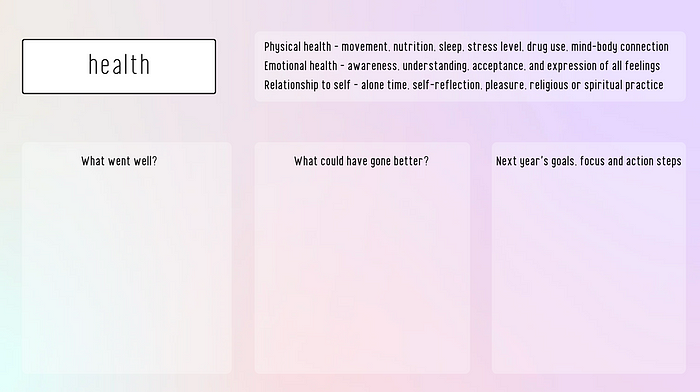
Look at your overall health and well-being in the past year — how were you physically, emotionally, and mentally?
Which activities left you feeling drained, and which activities gave you energy? Has your health improved, deteriorated, or remained constant? How do you feel about your levels of movement, sleep, stress, awareness, pleasure, and time with yourself? Did you move in ways that supported your strength, health, and energy levels?
It can be tempting to lose yourself in storylines — either on how great you are doing or on how much you fucked up. But neither is true. Try to let go of any judgment and take stock of what you did and didn’t do.
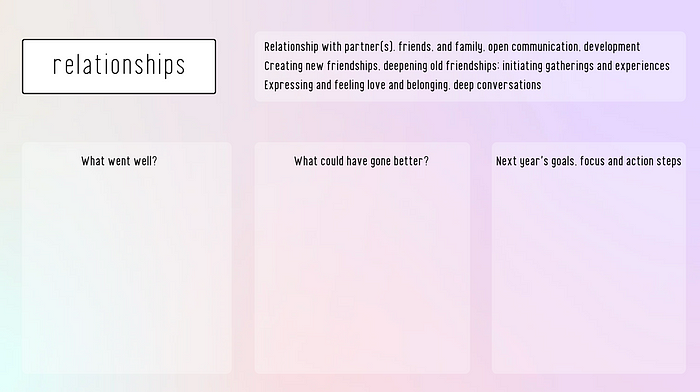
Think about the relationships in your life and the people you spend time with — your partner(s), friends, parents, siblings, and more.
Which relationships gave you energy? Which relationships drained your energy? With which people do you feel safe? Who can you be vulnerable with? When have you felt connected to your community? How have you supported the people you love? Which conversations moved you? What new relationships would you like to bring to your life in the next year?
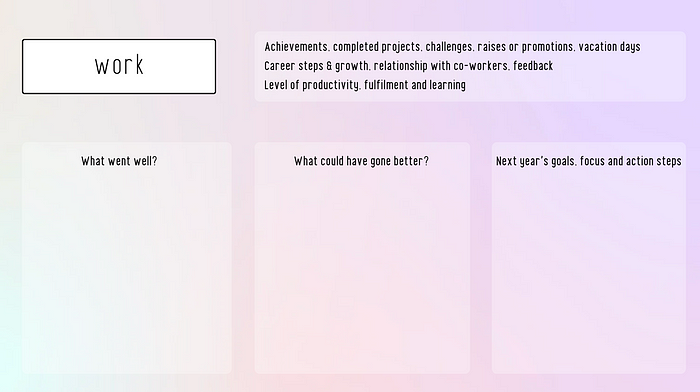
Consider how you spend your time and energy on work. Use your work emails, your work calendar, or meeting notes as evidence to get a better picture of what you worked on this year.
How do you feel about the role work has in your life? What achievements and challenges are you most proud of? What were your favourite projects? What professional relationships impacted your trajectory? How have you supported fellow workers? When did you feel most and least productive?
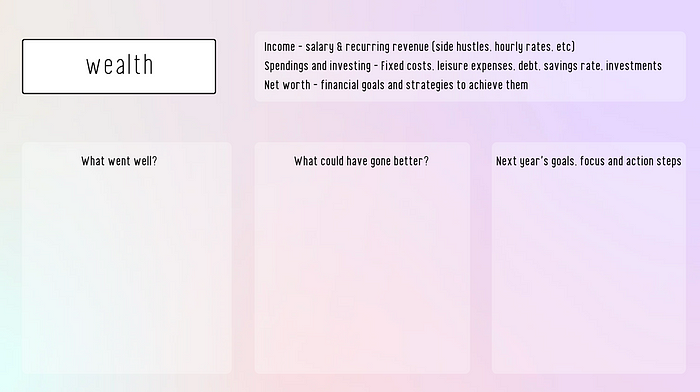
Most people live from paycheck to paycheck. Don’t feel bad if you have neglected this part of your life so far. Financial literacy is inherited — if your parents aren’t smart about money, chances are high that you don’t know essential investing principles.
Your annual review is a chance to take stock of where you’re at. Are you happy with how much you earned, spent, saved, and invested? How did you develop your net worth (assets (what you own) minus liabilities (what you owe))?
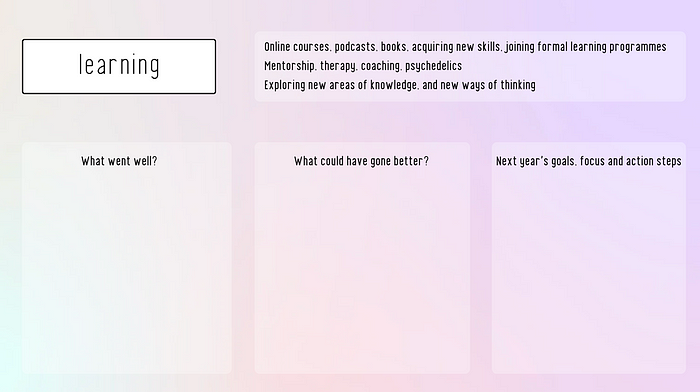
Knowledge isn’t permanent. Most of what we consider truth today decays within a decade from now. Nothing will benefit you more than learning how to learn and becoming a lifelong learner.
When you look at your year, ask yourself what things you have learned, e.g. through online courses, books, podcasts, or formal training. What was the most helpful thing you learned this year? What skills have you developed, and how did you progress? What do you need to continue and accelerate your desired learning path(s)? What new skills do you want to develop?
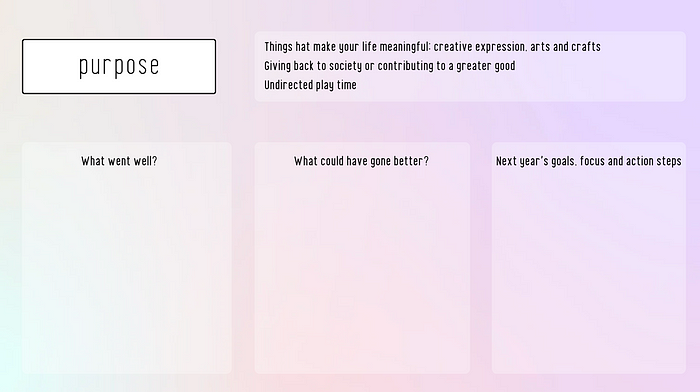
Your purpose is a deep understanding of the impact you’d like to make on the world. It’s the fuel behind your efforts and where you spend your time and energy. I find this the most challenging part, and I never felt done.
What fills you with excitement and passion? What can you contribute to have a positive impact on the world and our interconnected beings? What makes your life meaningful? How are you useful to humanity?
Write down your best version of your purpose statement(s). Don’t stress about the perfect purpose(s); you can adapt and change them anytime. You can have as many purposes, statements, and goals as you like.
3) Looking into the future
In this last part of your annual review, you look into your next year. You write from your future self, involving all of your senses.
Where do you live? What do you smell, see, hear, or touch? How do you feel when you wake up? Which habits do you follow? What do you work on? Which projects have you committed to? What have you let go of? What people do you spend time with? What hobbies are you pursuing? What are you learning?
Don’t edit yourself while writing the story — it can be as long as you like. You can do it in your journal, on a piece of paper, in the template, or in a text file.
The more vividly you describe your future life, the more emotions will emerge. And your feelings can serve as a helpful primer for your unconsciousness. This narrative is no fixed roadmap; this prompt invites you to dream and think big. Don’t edit yourself while writing it; try to ignore your judgmental voice as much as possible.
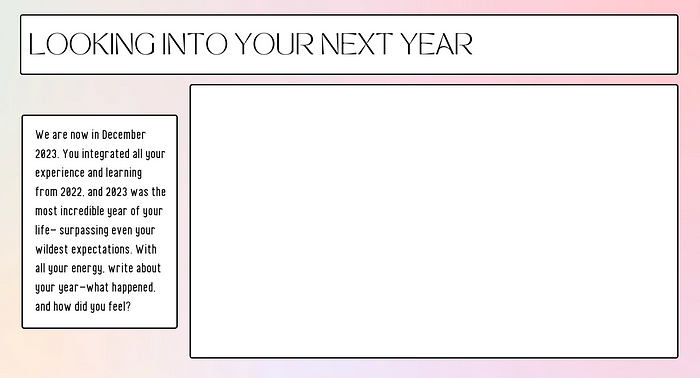
Conclusion
Taking the time to do your review, one question at a time, will help you reveal life lessons and critical insights you can integrate into your next year.
Do it a couple of years in a row, and you self-witness the power of consistency over a long period. You can replace all-or-nothing sprints with a more sustainable marathon mentality.
Whether you have 15 minutes or 10 hours doesn’t matter — the most important part is that you do it. Save the template, schedule in a couple of minutes, and give yourself space for one of the most direction-setting activities you can do all year.
Want to get more helpful tools like this?
Subscribe free to my Learn Letter. Each Wednesday, you’ll get proven resources that elevate your love for learning and help you live a happier and healthier life.
